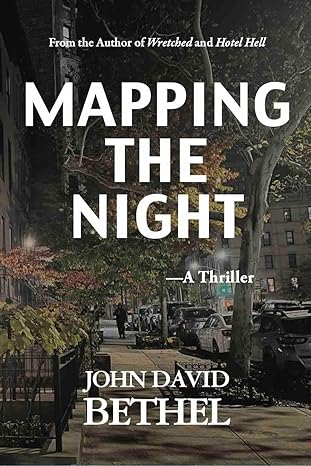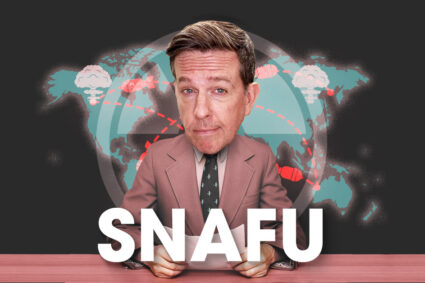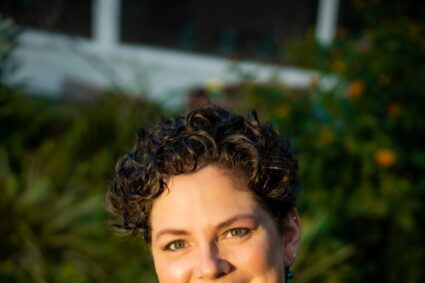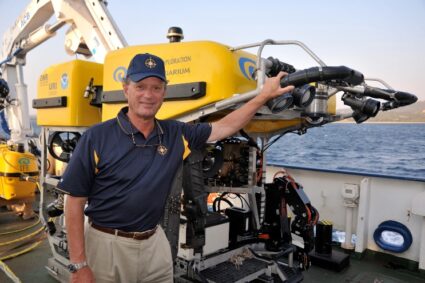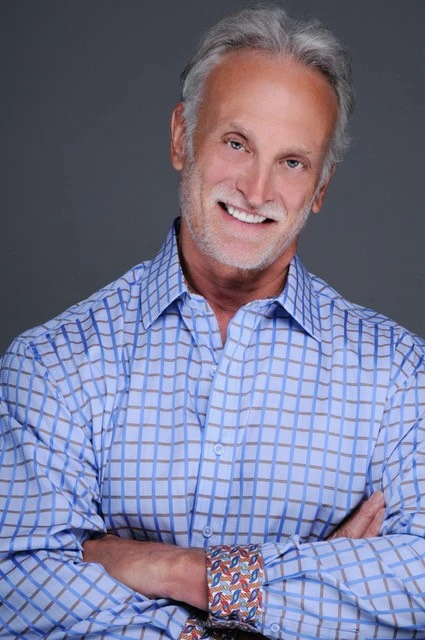
On this edition of SNAPSHOTS, for the first time in several years in my life, I get to be outside on a beautiful day in DC proper to do an interview. Today, we get our dose of suspense this month with the upcoming release of Mapping the Knights from Brick Tower Press. This book follows the hunt for a serial killer terrorizing New York’s Upper East Side in attacks carried out only undercover of dark, bringing the reader into a shadowy underworld where evil lurks everywhere and nothing is at it appears now.
Although, our guest has set past novels in our nation’s capital, this is the first book that he wrote where the setting is in of all places, New York City, a city that is very close to his heart. He’s a former press secretary and speechwriter to prominent members of Congress and cabinet secretaries. He has lived in the Nation’s Capital from the 1970s to the 2010s. You may have read some of his work as Evil Town and Holding Back the Dark. Ladies and gentlemen, my friends, we are outside of Starbucks, and we are talking to J. David Bethel.
David, welcome to SNAPSHOTS!
Thank you very much. I enjoy I appreciate you talking to me.
Anytime, this is a beautiful day & we’re enjoying some coffee. So it’s a great day. Now, this book, as we mentioned in the opening, is based on a New York Times article in which a woman was strangled a serial murder case in the Big Apple. Let’s dig deep about how this article turned into a novel for you.
And that scene that that haunted me, plus there was some developments later on, as the case was looked into, the cops noticed that the that the apartment was immaculate. I mean, it was like someone had come in and just cleaned it to within an inch of its life, but more so than someone, you know, a murder might do to try and get rid of the any evidence of his having been there. So that was very strange. And then it turned out, as they investigated this, this murder, and they kind of put it together with some others, and this particular man preyed on women, single mothers with male children. So, I put all of that together and went from there and wrote it.
And how long ago did you discover this article in New York Times?
Oh, I imagine it. I’m trying to think now, if the book’s coming out here, I finished the novel maybe at the end of last year. It took me about six months to write the book. So, if you kind of put it all together, maybe a year ago.
Now this book, unlike your previous books, is based in New York City, and you have a tie to the city. So do you feel that this book is a love letter to New York City?
Not really, because when I read the book, the circumstances in which the story takes place. That is, they’re people being killed. I wouldn’t call that a love letter, however, one of the characters in the book named Warren Winston is a man who’s inflicted with a condition called pigmentosa, which makes him basically allergic to light, any kind of light, so he can’t go out in the day. He lives in a darkened apartment. But the point here is that I put the reader in his shoes as he walks around New York City prior to being involved in the in the crime. He walks around New York City and he introduces the reader to a number of different places, like Central Park, The Drake Hotel, The Dakota Hotel, The Plaza where he lives, and so on and so forth. So, it is a kind of an homage to New York through Warren’s eyes.
So, you mentioned a lot of the hotels and places in New York City. The Dakota we’re familiar with the assassination of John Lennon. The Plaza was featured in Home Alone 2, one of the best hotels in the city. Talk about the research of bringing New York into the heart of this book.
Well, there was a lot of research in the sense that, obviously, I had to find, do the background, and go in and out about these hotels. I had visited some of them, The Plaza, for instance, and I’ve seen the Dakota and so I went back. I went into various architectural journals, and also use the ever-useful Wikipedia, but I did spend a lot of time in Central Park, of course. There’s a lot of Central Park in there. The background, Central Park used to be a place where they herded goats and raised goats. Basically, a goat pasture is what Central Park used to be. And there’s a castle in in the middle of Central Park that goes way back.
So, all of this had to be researched and understood. So, you can give the reader a bird’s eye view of all the places that Warren Winston is visiting. And that’s important, because Warren happens upon who he calls “the dancing man” in front of these buildings he sees because some of the murders take place in these buildings. And being in New York, initially, he dismisses the anything. He said, “you know, New York is strange. You’re going to see people doing these strange things.” Then he realizes, after two or three nights, that the man is dancing in front of buildings where the murders took place. So that’s kind of the jumping off point on how he gets involved in the whole mystery.
Very interesting, especially, you know, in New York they’re all different types of characters, whether they’re good, bad, happy, some of the weirdest characters. I always see them in New York City. Now, going back, you are a son of a Foreign Service Officer with the US State Department and you grew up abroad, talk about some of the places that you lived in the past and how they impacted on your life personally.
Well, I guess in the broad scope of things, they impacted on my life, because it gave me a much broader perspective on life. I suppose being the outsider growing up in these various countries is a lot different than Americans growing up in their neighborhoods, and they are basically newer to their neighborhood. They know what to expect when they get up every morning, and they know where they’re going to be, and so on and so forth. I grew up various cities in Europe, in Japan, and three cities in Japan, in Havana, Cuba, and then back and forth between there in the United States over a 14-year period when I didn’t live in the United States. We visited, but I didn’t live there. I totaled up one point that I went to 10 schools before I ever got to high school.
Fascinating. And of all the places that you lived in abroad, what was your most favorite and why?
I would have to say probably Havana Cuba. And maybe that’s because I was 10 to 12 when I was living in Havana. So, you know, I have a better memory of Cuba than some of the other places, although I do have memories of Japan and certain memories of Germany, but the sharpest memories are probably Cuba. But there’s one other reason.
When we were in Cuba, my dad was the press attaché, as you said, so he had to Castro. We were there one year before Castro. And a few months afterwards, my father put together the first international press conference that Castro had in in Cuba about a week after he got he assumed power, and it was at one of these fancy hotels in the middle of Havana. My father had put Castro in a room downstairs. I guess these days you’d call it the Green Room. And while he prepared the room where the press conference was going to take place, and then brief the press and so on and so forth.
He took me down when he went to get Castro to bring him upstairs. So, we walk into this room, and of course, all of us who have lived in Cuba were acutely aware of what was going on the Civil War, who the players were; Castro, Che Guevara, and all the rest of them. So, we walk into this room, and there’s Castro sitting on a couch with Che Guevara, with his brother, Raul, and with a man that Americans don’t know him very much is Camilo Cienfuegos, who was really the hero of the of the revolution. He was the brains behind the Cuban Revolution, not Castro. Castro was kind of the front man of mouthpiece.
Anyway. Castro stands up and approaches my father and every boy compares everyone else in their orbit, to their father, naturally. My dad was a big guy, about 6’3”, 230 pounds and Castro was a big man too. So that impressed me. Of course, when you’re young, you’re impressed with the size of people. He walks over and he notices when he’s talking to my father. I’m not paying attention to what they’re talking about because I’m 10, I don’t care, right? But I am looking at his sidearm, he has a pistol on his side and then Castro notices me looking at the pistol. So he looks down at me, then looks up at my dad. Says, “would you mind if I, you know, your son’s fascinated by this gun here. Would you mind if I took the bullets out and disarmed it and let him look at it while we’re talking?” So my father says, “No, of course not.” So, we go through that, then my dad takes Castro and his group up to the top of the hotel.
On the way in the elevator, Castro says to me… Look, his English was pretty good. By the way, I spoke Spanish, but his English was pretty good. So we kind of went back and forth. And he says, “Your dad explained to me that he has me sitting on a couch in front of the room, and there’s a coffee table in front of the couch with water on it, a pitcher of water and a glass. He says, “I tend to talk a lot, so I’m going to point at you when I want water, and you pour me a glass of water and give it to me whenever I give you the high sign, right?” I said, “Okay, fine.” So, we’re going through. He goes in the press conference begins and again, 10 years old, I can care less what they’re talking about, of course, but I’m watching what’s going on, and Castro has his, what they call “barbudos,” his security people, and they’re all bearded up, and they all have these, you know, automatic weapons. So, it’s just a fascinating scene for me. I noticed at one point that Castro was getting very aggravated, so I honed in. My focus was back on Castro, and I realized that he was arguing with the reporter. The American reporter wanted him to answer a question about whether Castro was going to allow gambling in the city when he officially took office. Castro, for whatever reason, didn’t want to answer that question, and kept dismissing the guy, and I kept coming back at him.
And then you’re talking about influence, my writing. The scene that came next with Castro, it was like a black cloud or something came over him, and his whole demeanor changed. They talk about shark eyes, and these deviant people with these looks that you look right through people and stuff – that was him at that moment. Then, I remember it distinctly, at 10 years old, thinking, “My God, what the hell just happened to this guy? He totally changed personalities.” Now we know, subsequently, he was not a very good guy, and he created a lot of problems, but that that was an indication that there was going to be a problem to, of course. Not something I thought about, but I use that whenever I want to describe one of these people. I kind of go back to that scene, and described the person in that way, that total change in personality from black to white, just like that.
That’s a very powerful story, and I’m so glad it stuck with you after all these years.
I’ll never forget it. It’s something that’ll stick with me until I’m no longer here.
Stay tuned for the second part of this wonderful interview. Check out Bethel’s newest novel Mapping the Night, wherever books are sold. Until then, keep on reading – for its fundamental!
